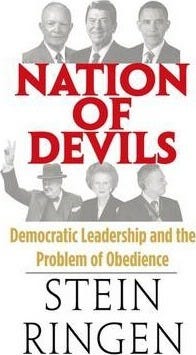Reviving Political Cultures in the U.K. and U.S.
A Review of Nation of Devils by Stein Ringen
When I was revisiting the relevant chapter in Fukuyama’s 2nd volume I read in high school for a course, I ran into an interesting reference from Stein Ringen, the author of another book I read on China, The Perfect Dictatorship. This book, Nation of Devils, turns his attention to the causes of declining governance in the U.S. and the U.K.
The title refers to a quote from the philosopher Immanuel Kant on how no good comes from assuming people are angels; we need institutions to maintain order in a nation of devils. And yet, what is meant when we imagine institutions that restrain our worst impulses is poorly understood. I have previously ruminated on these pages about Trump’s assault on government, a “a conspicuous continuation” that started in the Reagan era. The consequence of this assault is that many of these elements of public life that we thought were protected the full force of our institutions actually amount to a line of defense that consists of a thin veneer of norms.
This book is a good addition to that initial observation. Good rules produced by esteemed institutions with the requisite authority can control devils, but the authority required for the rules to be deemed “good” and accepted will erode unless it is paired with a good culture that makes it hard for people to be devils. As a perceptive observer of current events, Ringen assigned the U.S. to a starring role in the story of how global beacons of democracy have been reduced to substandard governance. The U.K. had a supporting role because its dysfunction was of a very particular kind of institutional dysfunction from Parliament, not a broader cultural dysfunction that liberates devils to wreak havoc unencumbered. He thus makes a stark distinction between faltering democracies that require leadership when the system is still workable and the imperative of deliberative reforms that restore legitimacy to an external political climate that is ungovernable.
Recognizing that the U.S. was in the latter situation required some foresight, as very smart political observers are only now starting to realize that the politics of competent leadership is no longer tenable. But he also wasn’t quite the oracle to predict that the U.K. too would cross the Rubicon of ungovernability due to a political climate that is equally unforgiving with the resurgence of nasty populist outrage, culminating in Brexit.
The question Ringen poses in the introduction is all the more chilling today because both the U.S. and U.K. have continued their slides, with the U.S. starting from a lower base. How have these two great democracies fallen so far? The leftist answer is to simply say they were never great. I do not think that entirely correct; Ringen is correct in stating that the cultural dysfunction that pervades our politics is new. The neoconservative contribution, particularly from Fukuyama and Patrick Deneen, that democracy is a victim of its own success is more on track. The normative goal of democracy in establishing equity through isothymic pressures has made democracy unsatisfying even as it has succeeded in advancing human flourishing on an unprecedented scale, leading some to find new value in the old passions of meglothymia, or reasserting differences between people. Machiavelli predicted this problem of reactance, “Men who believe they are equals cannot be managed in a way that rulers wish.”
This is one way to interpret the twin failures of New Labour in Britain and the promise of the Obama campaign in the U.S. Both promised to usher in a new era of governance that would finally bring an end to the Thatcher-Reagan moment, where inequality had appeared to hit escape velocity. That comparison is not frequently invoked because they were not elected at the same time. But both the Obama coalition and New Labour had transformed their respective election maps in ways that put the fear of God in their more anti-democratic adversaries, the corporate donor class in the U.S. and the heirs of aristocratic privilege in the U.K. The combination of popular support and competence terrified the beneficiaries of supply-side policies, so they went to their toolkit to frustrate change and sabotage reform by all means necessary. When faced with such powerful and recalcitrant opposition, progressive leadership was forced to come to the bargaining table.

In this vein, the answer to why competent leadership didn’t do better was simply they were not allowed to backstage actors who control the agenda (link directs to Sen. Sheldon Whitehouse’s wonderful speech on backstage actors during Amy Comey Barrett nomination). I think this explanation likely holds more sway for the U.S. than the U.K. as an entire political party transformed into the Party of No under Mitch McConnell’s contemptuous leadership.
However, the American explanation may also apply to the British case because both have neglected governance as craft. In particular, both have fallen victim to a related pathology — expending more resources for less productivity. Even though America is still highly educated at the upper reaches of the bureaucracy, too often the heads of agencies have conflicting mandates. There seems to be a democratic pull to these directives, even as democratic publics abhor the outcome, as citizens do not want to regard bureaucrats in the “deep state” as our betters and fear giving them the discretion that the theoretical literature on state capacity suggests because they will be relinquishing their control of broad public policy goals.
Citizens in the Anglo-American world should not be surprised by this outcome because political leadership has long since abrogated its responsibility to articulate those goals and persuade the public that they are worthy of their passive support, Ringen argues. Deriding Gordon Brown’s technocratic approach to wicked issues, Ringen offers a concise but illuminating perspective on the problems of British governance:
Commons is not a partner in governance. Local government is bereft of autonomy. Cabinet government was abolished. A once proud and independent civil service has been demoted to servitude. The government did, everyone else was done to.
He suggests South Korea during its transformation phase as a potential contrast in it relied on voluntary campaigns of citizen governance.
But I am left wondering if that is a useful comparison to the Anglo-American predicament. Poverty at a society-wide level is not a wicked problem like the issue of governance in the U.S., and because of our wealth Americans are complacent to the degree of wickedness that pervades our political culture. The paradoxical implication is that it may be easier to “pull” and “push” citizen input and participation in nations with less resources and lack formal democracy than in wealthy nations where the veneer of formal democracy is preserved but faltering.
In my last day at LSE, I attended an informal mentorship lecture delivered by the LSE director, Minouche Shafik. She made one very perceptive remark about the dangers of populism, but, like many of her peers, strangely neglected the 2nd order nature of the populist predicament. The remark was that we cannot let populists storm the gates of our institutions and expel social science expertise from those institutions because both the individuals and structure of rules are lines of defense against bad governance by kakistocratic ministers. No matter how bad they are, they can do no harm so long as they don’t direct their assaults at the institutions themselves. Conversely, in developing countries that lack institutions, competent ministers cannot overcome the collective action problems that bedevil their governance. Here, there is no alternative to building governance capabilities, even if NGO procurement is sometimes necessary in the short-term.
Shafik is not entirely wrong, only slightly misguided in the preoccupation with institutions. Recall Ringen’s statement in the introduction that it is easier to make sure that people do not feel tempted to act like devils in first place by way of political culture than it is to control them with rules. Whether Shafik’s remark is correct in developing countries that require enhanced rule-making authority for reasons outlined by Fukuyama is unclear, but Ringen’s corollary is more appropriate for high capacity settings that require discretion. In good political cultures, bad leaders do no harm. In bad political cultures, good leaders do no good.
That is why I firmly believe that what is needed from the young government students in that room is not primarily the expertise that allows institutions to function but the leadership and wisdom that improves the authorizing environment within the broader political culture that enables them to function properly. The focus therefore should not be on walling them off from populist assaults, but political leadership that reclaims its formative role in the arts of persuasion.
Ringen’s suggestion of committees are a wonderful idea to close the gap between the quality of expertise in American society and the dysfunctional ignorance of our politics. That process may also increase the openness that currently eludes us as the American political system has allowed backstage actors to proliferate and dominate, but only if citizens do not lose sight of the big picture goals of what we hope to achieve. That is why ordinary wisdom of what America ought to be must be represented. Only then can we hope to resolve the predicament of political decay that foreshadowed the populist surge where governors pretend to rule and citizens pretend to obey.




